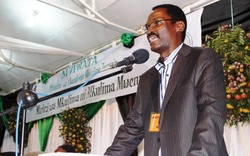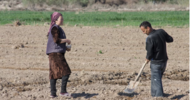
Mr Stephen Ruvuga: "Even when farmers are helped, very little money reaches them. PHOTO: THE CITIZEN PHOTOGRAPHER
Business Week
Smallholder farmers lose in most govt programmes
The network of farmers’ groups was established to unify smallholder farmers through their groups to have one voice in their struggle for their socioeconomic welfare. As a way to liberate the farmers, we created awareness on various issues affecting them.
INTERVIEW. The Network of Farmers’ Groups in Tanzania (Mviwata) recently celebrated its 20th anniversary alongside an annual meeting in Morogoro. BusinessWeek Reporter Alawi Masare attended the four-day meeting. He also interviewed the network’s executive director, Mr Stephen Ruvuga
Has Mviwata done what it intended to do?
Generally, yes. We are on the right track. The network of farmers’ groups was established to unify smallholder farmers through their groups to have one voice in their struggle for their socioeconomic welfare. As a way to liberate the farmers, we created awareness on various issues affecting them.
So, going through those issues, I can say that we are doing well. We have created a wonderful voice platform to small-scale farmers, built infrastructure and created awareness on land issues, government policies touching farmers and agriculture and now the ongoing constitutional review. Some farmers have really gained enough awareness and are political leaders.
Apart from what you have said, what are the tangible achievements in the 20 years of the Mviwata existence?
The Kibaigwa market in Dodoma – probably the largest grain market in Tanzania – was built by Mviwata.
We also constructed agro-produce markets in other places. Examples are Mgeta’s Kinole, Nyandira and Tawa markets in Morogoro Region; Mkata in Tanga; Igagala in Njombe; Igurusi in Mbeya and Matai and Kasanga in Rukwa. All these have not only facilitated rural farmers to access reliable markets and better prices, but also contributed to the improvement of the economy.
What challenges are you facing in your daily operations?
Challenges are many, but as an institution we have a challenge of resources, financial and human. We have them but they are inadequate to support our countrywide operations.
Again, smallholder farmers are still missing an opportunity to be heard.
Once farmers, through their network, come out and speak their agenda, they are seen as stubborn and their policy suggestions are considered primitive.
We also face policy challenges especially on land.
It has been argued that life will be good for farmers if they use genetically modified organisms, or GMOs, in short.
What are your views on that?
Our stand as a farmers’ network is that the GM technology in Tanzania is still not yet relevant to small farmers.
There are many issues concerning GMOs, like effects to farmers and biodiversity which are not yet clear and many questions remain unanswered regarding the issue.
There are two opposite camps talking about the use of GMOs: one supports and the other rejects it.
There is also evidence that GMOs have negative effects and that’s why some countries have enacted laws requiring suppliers to clearly separate GM foodstuffs from non-GM foodstuffs in markets. This shows that there is something wrong.
GMOs force farmers to continuously depend on suppliers’ seeds every year. All in all, GMOs need an unusual system of farming, their seeds are costly and their potential threat to our biodiversity is very high.
Do government initiatives on agriculture help Tanzanian farmers?
Frankly speaking, most initiatives like the Southern Agricultural Growth Corridor of Tanzania, or SAGCOT, target large-scale farmers and probably profit-oriented foreign companies operating in the country. Smallholder farmers are always losers in most government initiatives.
For instance, SAGCOT targets to help 100,000 farmers in all regions it operates. Nothing is said about 38 million farmers in Tanzania!
There is no hope at all with these initiatives and we see them as a way of hampering growth of farming in Tanzania. Even when farmers are helped, very little money reaches them.
What are your views on Tanzania’s investment in agriculture?
Large investors cannot compete with small-scale farmers and in most cases investment system negatively affects small-scale farmers. The Tanzania Investment Centre attracts them but permits are manipulated by grabbing land in rural areas.
Some village authorities distribute land to investors even beyond their jurisdiction and therefore violate farmers’ rights. There is also unfair land compensation and unfulfilled promises as shown by a survey in Kisarawe.













